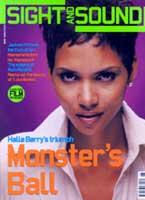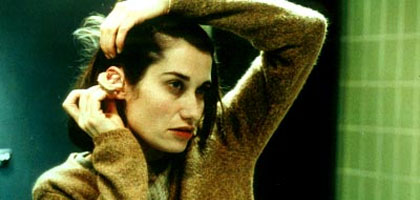
Hear No Evil
Film of the Month: Read My Lips

Read My Lips combines a workplace romance with a neo-noir thriller centred on a deaf femme fatale. By Richard Falcon.
After his accomplished French-resistance drama A Self-Made Hero (Un Héros très discret, 1996), Jacques Audiard's Read My Lips (Sur mes lèvres) returns to the neo-noir of his debut See How They Fall (Regarde les hommes tomber, 1993). It demonstrates how discreet but ambitious aesthetic daring and an eye for nuance and detail can produce intelligent, absorbing and resonant European genre cinema. As the strapline on the film's French posters - "She taught him good manners, he taught her bad ones" - suggests, the opening scenes, detailing the heroine's daily office drudgery, seem to cue a comedy of manners. Secretary Carla's isolation within office life is fluidly invoked by a sense of claustrophobia - her environment is both blandly oppressive and recognisably everyday, another contribution to French cinema's current preoccupation with the world of work and its discontents. The film's initial premise - Carla (Emmanuelle Devos) is a wallflower with a hearing impairment having to contend with misogynist colleague Keller - is reminiscent of Neil LaBute's In the Company of Men (1997), but Audiard reverses the angle to focus on Carla's needs and desires. The film's success as both drama and thriller rests with its ambiguities about how dark and complex these could be.
At the film's start Carla has learned to use her disability in a similar fashion to LaBute's heroine at his film's end: to refuse unwelcome incursions from the outside world. At the office or as she dampens out the screams of her baby-sitting charge, Read My Lips crafts its soundtrack around Carla's perceptions, drawing us into her world without needing too much exposition. The emphasis is on gesture and expression, caught in tight close-ups with a foregrounding of hands and objects that verges on the Bressonian. The opening close-ups of Carla placing her hearing aids discreetly behind her ears, covering them with her hair and scooping water into her mouth from a bathroom tap bind us to her sensory impressions. As the movie progresses, it matches this visual and aural immediacy with a deliberate and teasing reticence about Carla's history and motivations, preventing us from reaching easy judgements or being able to predict her actions.
Emmanuelle Devos, veteran of a number of relationship dramas directed by Arnaud Desplechin, is terrific in subtly impressing on us Carla's outsider status, soliciting our identification while preserving a sufficient edge of creepiness to keep us worried about what's going on in her head. We are unsure, for instance, whether Carla's colleagues know of her disability - whether it's a factor in their mistreatment of her is unclear. To add to the ambiguity, Audiard furnishes us with an early sequence, opaque to non-signers, in which Carla impatiently waves away a deaf man distributing sign-language leafiets in a café, alerting us to a possible ambivalence in her relationship to her own hearing impairment as well as making us wonder about the psychological roots of her social isolation. This is intensified when we see her alone later in the movie 'rehearsing' dialogue for a date with an almost Travis Bickle-like air of disconnected, candid intensity ("So... you go with prostitutes?").
In a more formulaic movie Carla would be a victim, an underdog heroine or an outright villain, femme-fatale status usually being denied characters defined as conventionally unattractive. In Read My Lips she is either all or none of the above. As she sits in the office cafeteria with Vincent Cassel's Paul and reads the lips of the arrogant Keller ("He's saying, 'A dog like me is lucky to get a guy like you'"), Audiard uses her disability - and his adept blending of everyday office horrors and the crime thriller - to give a new wrinkle to the paranoia at the heart of film noir. Carla's disability, through the skill of lip reading, leads her to know too much about her surroundings, not too little. With genuine savvy, the bridge to the thriller elements in the film's _nail-biting second half - as implausible as these may seem on cold refiection - is built on her eventually being able to employ this skill to get what she wants.
What she wants (after a comic trip to recruit him as her new assistant at the employment exchange, which she treats as a dating agency) is Paul: Vincent Cassel as the kind of French small-time roughneck played in the 1970s by Patrick Dewaere - inarticulate, perhaps none-too-bright, prematurely worn down, but tough and resourceful. Cassel inhabits his character so fully that no backstory beyond Paul's debt to gangster Marchand - Olivier Gourmet as the kind of outsmarted small-timer patented by Elmore Leonard - is required. When Paul jumps Carla, believing that she must have found him a temporary fiat on one of her firm's building projects in return for some rough sex, she fends him off, later patiently explaining, as if to a child, his mistaken motivations.
Alone in front of the mirror, trying on sexy shoes, Carla experiments with hitherto impossible identities, a self-made heroine. When she becomes enmeshed in Paul's violent demi-monde, and starts to dress more sexily at the club, Paul has to rescue her from being raped in the carpark. Shot again from Carla's POV (the film's violence is more effective for occurring mostly off screen, allowing Audiard to manipulate the elements of cinema to powerful effect), this is less a reassertion of macho values or a punishment of Carla than a reminder of the harshness of Paul's environment. Carla's true self-realisation comes through the thriller resolution, when the shifting balance of power lands in her favour at a moment of extreme danger.
When Keller early on falls prey to Carla's use of Paul's criminal skills to exact professional revenge, her exultation in the moment is presented as almost sexual, just as her pose as Marchand's mistress allows her to parrot comically her friend Annie's boasts about her own active sex life ("like a mindless piece of meat"). And as Paul, beaten and helpless and handcuffed, turns to Carla as his last hope, watching through binoculars from a nearby rooftop she reads his lips with increasing excitement ("Yes... yes"). This ambiguous consummation - she is now needed like never before - allows this smart French thriller to redefine the third-act climax.
If Read My Lips' thriller and relationship elements come together at the end with a neatness many a well-doctored Hollywood screenplay would envy, the film nevertheless leaves us with a deliberate, nagging inconclusiveness. A subplot involving Paul's middle-aged parole officer Masson apparently worrying about his missing wife is left dangling, as we see him being led away by police, presumably charged with killing her. "He's saying he loved her," says Carla, reading his lips.
The film's unsentimental worldview is strangely encapsulated, though, by the unexplained intermittent sequences of Masson bereft, alone and suicidal - as bleak a character as Gaspar Noé's desperate middle-aged butcher in Seul contre tous. These episodes point perhaps to a wider malaise, beyond the instrumental concerns of thriller plotting, in which work, sex and love are driven by unknowable solitary fantasies and steered by hard-headed negotiations and survival ploys dictated by an at best indifferent, at worst hostile world.
